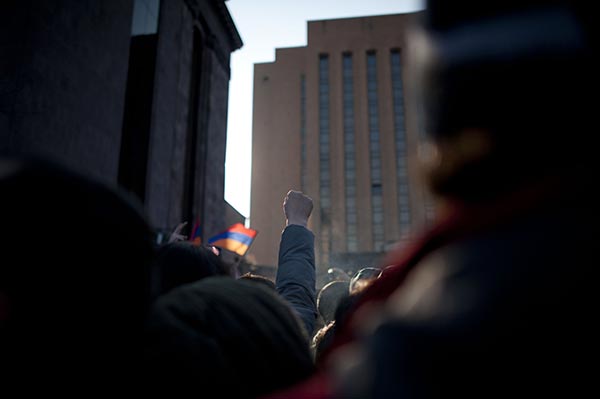
Murder of Armenian Family by Russian Soldier Severely Strains Moscow-Yerevan Relations
Publication: Eurasia Daily Monitor Volume: 12 Issue: 10
By:

The situation in Armenia has suddenly became extremely tense after six members of the Avetisyan family, including two children, were murdered on January 12 in Gyumri, Armenia’s second largest city, on January 12; meanwhile, the family’s six-month old baby, also wounded in the attack, is struggling for its life. The initial shock of the incident has turned into anger the following day when more information about the case became widely available.
The preliminary investigation showed that most of the victims died from gunshot wounds, and an AK-74 machine gun, munitions, as well as 21 used cartridges were discovered at the scene (Azatutyun.am, January 12, 2015). As the police started patrolling the streets, city residents noticed that a number of armed Russian military personnel from the base located close to the city were also taking part in the patrols. This immediately caused confusion and raised questions from civil activists. Armenia’s standard code of criminal procedure does not allow such involvement by foreign military personnel. Soon, it was announced that Russian army Private Valery Permyakov was the main suspect in the case. After midnight, Russian border guards informed the media that Permyakov had been taken into custody about a mile away from the Turkish border as he was allegedly trying to cross it, and he was subsequently handed over to the Russian military base (Arka.am, January 13, 2015).
On January 13, the Armenian prosecutor general’s press service announced that, according to Article 61 of the Russian Constitution, Russia’s citizens cannot be extradited to another country (1in.am, January 13, 2015). That announcement resulted in wide-scale public outrage. The Russo-Armenian treaty provides that crimes committed by Russian military personnel in Armenia shall be investigated according to Armenian law, except in cases when a military crime is committed, or a law is broken directly on the base premises (Mid.ru, accessed January 14, 2015). So, while deserting the base with a weapon falls under Russian military jurisdiction, the murder of the civilians committed outside the base premises must be investigated by the Armenian side.
Meanwhile, a conspiracy theory began to spread about Azerbaijan’s or Turkey’s involvement in the case. Armenian Member of Parliament (MP) Tevan Poghosyan publicly expressed support for the theory that the Avertisyan family’s murders were part of a foreign subversive operation. According to him, Azerbaijan’s intelligence service might have recruited Permyakov, and this could have explained the Russian soldier’s attempt to cross the border into Turkey (Galatv.am, January 13, 2015).
On January 14, demonstrators gathered in front of the Russian consulate in Gyumri and pulled down the flag. Then a few thousand protesters marched toward the Russian military base. Police closed the road, and after waiting for a few hours, the demonstrators agreed to leave and wait for the prosecutor general’s promised statement clarifying the jurisdiction issue. In his remarks, the prosecutor general would also demand from the Russian side that it hand over the suspect to Armenian law enforcement. A small demonstration was also organized in front of the Russian embassy in Yerevan. Meanwhile, most Armenian state officials abstained from speaking about the case or only made vague statements about the need to avoid anti-Russian sentiments. In addition, Minister of Education Armen Ashotyan, in an interview with a Russian news agency, insinuated that the protesters were instructed to come out into the streets by “some [foreign, presumably Western] foundations,” saying: “I am not against civil society, but it must be ours” (Regnum, January 14, 2015). Notably, amidst this incident, some Russian media also made sarcastic statements about the possible involvement of non-governmental organizations (NGO) backed by the United States or the European Union (Vzgliad, January 15, 2015).
On the morning of January 15, the prosecutor general announced that the trial would take place in Armenia, but without making clear whether the case would be taken up by an Armenian court or by the Russian military court attached to the military base (Newsline.am, January 15, 2015). That afternoon, after the funeral service of the Avetisyans in Gyumri, a mass demonstration gathered in front of the regional public prosecutor’s office. The protesters demanded a guarantee that the trial and imprisonment, if stipulated by the court, would be carried out according to Armenian laws. The prosecutor general came out and addressed the demonstrators, though he avoided mentioning the jurisdiction issue. At that point, some of the demonstrators marched toward the Russian consulate where they were met by a police road block. Following a standoff lasting several hours, the two sides started to clash: some of the demonstrators threw stones, while the police used stun grenades. By 9 p.m. there was information about 12 people wounded, three of them policemen (Aravot.am, January 15, 2015). Subsequently, the prosecutor general promised to send an inquiry to his Russian counterpart proposing an investigation and trial under Armenian jurisdiction.
The police also detained three of the protesters who gathered on January 15 in front of the Russian embassy in Yerevan. As the protesters moved to Freedom Square—where mass gatherings are traditionally organized—and lit candles, the police entered the square, alleging that some of the protesters could be armed. By 10 p.m., a few dozen people were detained. Yet, by midnight, the square still remained surrounded by the police (Newsline.am, January 15, 2015).
In part, mass frustration and disappointment has grown because the Armenian president and prime minister have not made any public statements to address the case. At the same time, Armenian television avoids information about the investigation and the protest campaign. So far, only a few activists have been calling for a reevaluation of the framework of Russo-Armenian relations, particularly the status of the military base. However, public opinion is quite firm. And unless the Russians agree to the Armenian prosecutor general’s inquiry about the case’s jurisdiction, anti-Russian sentiments can be expected to grow. In that case, a serious crackdown by Armenian authorities against the protesters should be expected.
On the other hand, even if the jurisdiction issue is solved, it is likely that public demand will grow to address the issue of personnel discipline at the Russian military base; cases of Russian soldiers’ drunkenness and petty crime have been common problems in Gyumri for years, whereas Armenian law enforcement agencies have habitually avoided dealing with Russian military personnel. Even more far-reachingly, Russia’s meddling into Armenia’s internal affairs may again become the subject of public discourse and debate. In particular, Armenian society may start to more openly question Armenia’s compelled decision to join the Eurasian Economic Union, even though both the ruling Republican Party and the parliamentary opposition had voted in favor of joining the Moscow-led bloc.




